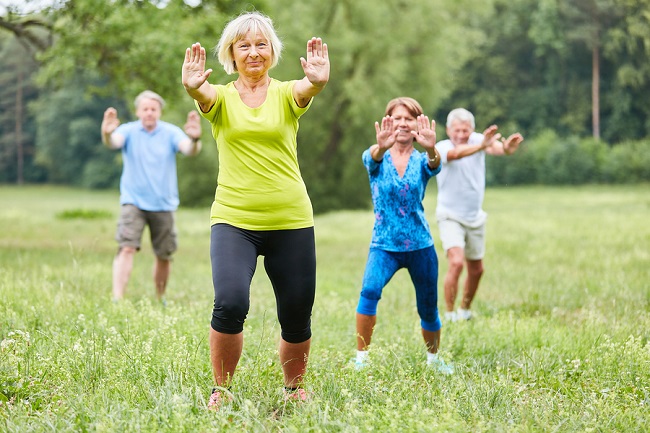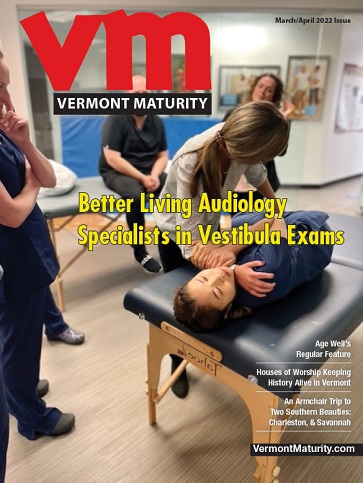“Meditation in motion” is a phrase that’s often used to describe tai chi. For seniors, the focused, low-impact movements can help clear the mind, just like meditation. Older adults can also experience many other benefits from this type of exercise, including increased strength, improved mobility, better flexibility, and stronger immunity.

One of the best things about tai chi is that you can experience all these health perks without a large investment in special equipment. Plus, you don’t need to have excellent coordination or strength to get started. You can even practice the movements in a chair. That adaptability is one reason why this practice is good exercise for seniors who may have physical limitations.
What Is Tai Chi?
Tai chi is an “internal” martial art that originated in China centuries ago. It’s considered internal because the focus is on developing mental or spiritual strength instead of defeating an opponent through physical strength.
The basic principles originate in the ancient Chinese philosophy of Taoism. Under the tenets of Taoism, everything is composed of two opposing (but complementary) elements: yin and yang.
Yin elements are feminine, soft, and yielding. Yang elements are masculine, hard, and rigid. According to Taoism, to achieve a peaceful and long life, we need to balance these sides within ourselves. The movements are designed to help you achieve this equilibrium between yin and yang. In other words, the “point” of tai chi is to restore balance in your body and your mind. In simpler terms, the gentle movements and focus on breathing can help you relax, get some light exercise, and develop body awareness.
It sounds like yoga, but the main difference between yoga and tai chi is that the latter exercise is based in movement and doesn’t involve holding static poses. So, many people find that tai chi is better than yoga for seniors who can’t stay in one position for very long.
Styles of Tai Chi
The styles are named after the Chinese families from which they originated (sometimes referred to as a style’s “lineage.”) Four of the main styles are:
Chen: The oldest style, which is more intense and focused on self-defense than many other styles.
Sun: The newest style, which involves a higher stance and smooth, graceful movements.
Yang: The most popular style, which focuses on gentle, flowing movements.
Wu: A variation of the Yang style, which is characterized by small movements.
As the activity has grown in popularity, different variations have developed. For example, Tai Chi Chih originated in California during the 1970s. It’s a simplified form that is suitable for many seniors. Another variation is sitting tai chi. It’s an excellent option for seniors who can’t stand or who are at high risk for falls. It offers many of the same benefits as doing the movements while standing.
The Basics of Doing Tai Chi
Tai chi is not difficult physically. No matter what type you do, the movements are slow and deliberate. One motion always flows into the next. In fact, it can feel a bit like dancing.
A choreographed series of movements (also known as postures) is called a form or a set. Each set has a certain number of postures, and a set usually starts with postures that are intended as a warmup. The number of postures in a set depends on the style.
Tai chi movements involve shifting your weight from one foot to another. All the movements are designed to create an awareness of how your feet are connected to the earth. Throughout a set, you are often slightly crouched, with your knees flexed. This posture helps to strengthen your glute and leg muscles, which are important muscles for balance. It’s also important to keep your back as straight possible. Over time, this postural awareness can help improve your posture in everyday life.
The Benefits of Tai Chi
This is a whole-body exercise—and that includes your mind. As a result, it offers an astonishing number of physical and mental benefits. Tai chi is good for seniors because it can increase both your lifespan and your “health span,” which is how long you can function independently. In fact, when it comes to overall lifespan, a study in the American Journal of Epidemiology found that this activity can reduce mortality, much like jogging.
Here are some of the many ways in which tai chi can improve your quality of life and reduce the negative effects of the aging process. But bear in mind that you should always check with your healthcare provider before beginning any new exercise routine.
Lower Risk of Falling
According to an article in the Journal of the American Geriatrics Society, practicing tai chi can reduce your risk of falls by up to 50 percent. Why is it so effective at fall prevention? Several factors are involved. Not only does the activity help with core stability, which can improve your balance, but it also improves proprioception (i.e., your awareness of where your body is in space).
It can also prevent falls by boosting your confidence. That’s because feeling uncertain on your feet is one of the biggest risk factors for falls. Researchers in the Journal of Aging Research have noted that seniors who practice tai chi feel more confident in their daily movements, making them less likely to fall.
Arthritis Relief
Multiple studies have proven that tai chi is a good exercise for seniors with arthritis. In fact, one study in the Annals of Internal Medicine found that it is just as effective as physical therapy in treating osteoarthritis in the knee. A different study in the Journal of Rheumatology showed that tai chi exercises are good for arthritis and joint pain because the movements help joints retain their range of motion, so they don’t stiffen further. Because the exercise is low impact and gentle, its beneficial movements don’t cause unnecessary pain.
The movements may also be effective for treating pain from osteoporosis and fibromyalgia. As well, tai chi is good for a bad back because it can restore mobility to the spine without jarring movements. Similarly, it can help with sciatica by increasing hamstring flexibility and improving your core strength.
Weight Loss
Because of its slow movements, tai chi might not seem like an ideal exercise for senior weight loss. But a study in Evidence-Based Complementary and Alternative Medicine has found that it can help you lose weight.
Here are some of the factors that might be at play: Developing greater mindfulness helps practitioners get in touch with their bodies’ hunger cues. And the activity offers a way to deal with stress that doesn’t involve turning to comfort food or alcohol. Plus, according to MyFitnessPal, you burn about 270 calories an hour doing tai chi, on average (based on a 150-pound person). That’s more than brisk walking or power yoga.
Improved Cardiovascular Health
Although it may not appear to be a very intense form of aerobic exercise, this martial art can improve your cardiovascular system. A study in the Journal of Alternative and Complementary Medicine showed that, with its focus on relaxation, tai chi is good for high blood pressure. It has also been proven to:
- Improve the overall quality of life for people with heart failure
- Provide a safe form of exercise for heart attack survivors
- Raise “good” cholesterol levels (according to the study in the Journal of Alternative and Complementary Medicine)
- Lower triglyceride levels
Better Sleep
For seniors who struggle with insomnia, this exercise can be a drug-free solution. That’s important because many drugs used to treat sleep problems can make older adults groggy and more likely to experience a fall. A study in Sleep found that seniors who practiced Tai Chi Chih (a modified form of the activity) experienced more improvements in their sleep habits than seniors who took classes on good sleep hygiene.
Enhanced Posture
Retaining good posture is an important part of aging gracefully. Not only does your posture influence how others see you, but it also affects your mobility and even your breathing.
Tai chi strengthens the core, which in turn can improve your posture. As well, learning to focus on the way you move can improve the way you carry yourself.
Improved Immunity
As you age, your immune system becomes less efficient. This exercise offers a way to fight that part of the aging process. As just one example, a study sponsored by the National Institutes of Health found that the response to the shingles vaccine among seniors who practiced tai chi was similar to that of people 30 years younger. Older adults who practice it also have a better response to the flu shot, according to a study in The American Journal of Chinese Medicine.
Reduced Anxiety and Depression
According to an article in Psychiatric Clinics of North America, many studies confirm that tai chi can help with anxiety and depression in seniors. (However, it’s important to note that this practice is not a substitute for any other interventions that your doctor recommends. Rather, it can be one important component of a comprehensive treatment plan.)
Several factors contribute to the positive effects on mental health:
- Because the focus is on breath and movement while doing tai chi, seniors get a break from thinking about daily stress.
- Doing activities that you enjoy can boost your mood, no matter what you do.
- Even mild exercise like this can raise your levels of mood-elevating endorphins.
- The smooth, flowing movements can relax your muscles and create a sense of well-being.
Cognitive Benefits
According to a study in Neurorehabilitation and Neural Repair, this martial art has been shown to slow cognitive decline in people with mild dementia. And tai chi classes for seniors can provide valuable social contact that can improve the quality of life for seniors with dementia.
Social Benefits
Discussions about the many health benefits of tai chi often miss one crucial element: It’s fun. After all, for seniors, engaging in fun activities carries its own rewards. Even if you can’t find a good class and have to practice on your own, the increased self-confidence you get can improve your ability to make friends.
You can find more information at American Tai Chi and Qigong Association website.
Related Articles & Free Vermont Maturity Subscription Sign Up

Curious About CBD? Here’s What it Can and Cannot Do for You
How to Reduce Risk Factors for Falls and Improve Functional Independence for Seniors







Comment here